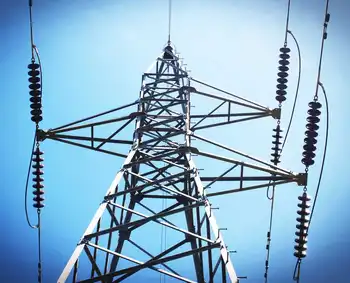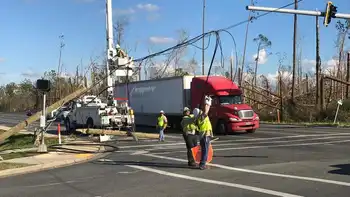Tempers flare at solar farm meeting
About mid-way through the session, which went over two hours, one resident asked for details about the relationship between the landowner, Spence Stewart, and the solar farm development company, Penn Energy Trust, to whom he is selling the land. Another meeting member stood up and demanded the company rep, Sean McCloskey, answer the questions being asked.
Stewart leaped to his feet from his seat in the front row, hands on hips, and said to the man: "It's none of your business.
"You shut up."
This is a "public meeting," the man shot back, saying he was not going to be told to be quiet. He left shortly after that.
The questions were posed again to McCloskey about what the status of the Bala Cynwyd, Pennsylvania company was in relationship to the purchase of the private property and whether Penn Energy Trust was a registered lobbyist with the government.
"I'm not registered as a lobbyist," McCloskey replied.
Earlier, McCloskey had said that an offer had been made to purchase the Stewart property, which totals about 500 acres in the area of Community Centre and Payne roads in Hamilton Township. In an interview prior to the meeting, McCloskey said the offer was contingent on several factors but did not disclosed those.
Generally, such deals are contingent on the developer acquiring approvals to proceed.
There are two separate solar farm proposals: a north one of about 200 acres and a southern one comprising about 300 acres, the audience was told.
"We're very early in the study process," McCloskey said.
A second public meeting will be held when all the environmental and other investigations are completed and used to create a draft design. This will all be done before a provincial government decision on the project, he said.
There is preliminary acceptance with the Ontario Power Authority, through the Feed in Tariff FIT program, on one of the two application, and McCloskey said his company is awaiting word on the second solar farm application.
He said Penn Energy Trust had initially done work to establish wind farms "in the west" but found public opposition made it unprofitable and turned its attention to solar farms.
During questioning, McCloskey said his company has never created or operated a solar farm in Ontario.
It currently has three applications in Northumberland County. The third is in the Wesleyville area, and a public meeting was recently in Port Hope.
Several residents asked if it were not Ontario citizens actually paying for the 20-year, renewable-energy contracts the government is giving to companies like Penn Energy Trust and had coal-fired plants been shut when renewable energy sources, like solar, had been put in place.
McCloskey did not directly respond to the contract payment question but said his company was following the procedures put in place by the Ontario government. He did not detail the closure of coal-fired plants elsewhere in the world, one of the goals of the provincial government.
Solar power will only be produced in daylight hours and is quiet except for the inverters which will be located within the panel arrays and not near the borders of the farm, McCloskey said. The noise the inverters make reaches about 65 decibels, somewhere between the sound of a dishwasher and a vacuum. A noise study is among those that must still be undertaken, he said.
A fence would surround each project and ground cover would be grown on the rows between, and under, the panel arrays, residents were told.
McCloskey noted that 60 of the components used in the solar farms, based on the rules of the government program, must be manufactured in Ontario. The panels for the proposed solar farms would be fixed, without moving parts, and would be south facing. They would eventually be hooked to a medium-voltage line like the two strand lines commonly seen along rural roads in the area, people were told, and used to provide power in this region.
There were concerns with the company's assertions the solar farm property would be on class 6, or poorer, agricultural lands. McCloskey said the maps came from the province and were not made by Penn Energy Trust. One of the program's criteria is that solar farms are not established on class 1 or 2 agricultural lands, he said.
Several residents expressed concern that the provincial government, and not the local municipal government, would have the local say on this type of land development. Hamilton Township Deputy Mayor Isobel Hie, who was at the meeting, asked if there would be a presentation to council and was told there was no requirement to do so.
Related News

Grid coordination opens road for electric vehicle flexibility
WASHINGTON - As electric vehicle (EV) sales continue to rev up in the United States, the power grid is in parallel contending with the greatest transformation in its 100-year history: the large-scale integration of renewable energy and power electronic devices. The expected expansion of EVs will shift those challenges into high gear, causing cities to face gigawatt-growth in electricity demand and higher amounts of variable energy.
Coordinating large numbers of EVs with the power system presents a highly complex challenge. EVs introduce variable electrical loads that are highly dependent on customer behavior. Electrified transportation involves co-optimization with other energy systems, like…





